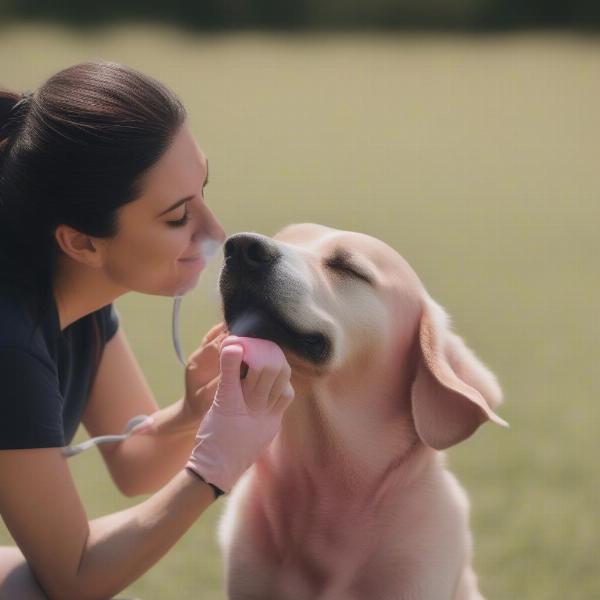A dog with a pink nose can be incredibly endearing. But what causes this charming pigmentation, and does it mean anything about the dog’s health or breed? This article explores the fascinating world of pink noses in dogs, covering everything from genetics and breed-specific traits to potential health concerns and proper care.
Decoding the Pink Nose: Genetics and Pigmentation
A dog’s nose color is determined by genetics, specifically the production of melanin, the pigment responsible for skin and hair color. Just like in humans, variations in melanin production can result in a spectrum of nose colors, from deep black to liver brown and, of course, pink. The “Dudley nose” is a term commonly used to describe a pink nose that lacks pigment. This can be a completely normal trait for certain breeds, or it can develop over time due to various factors.
Pink Noses and Breed Specificity: Is It Normal?
Certain dog breeds are predisposed to having pink noses, such as the American Pit Bull Terrier, Dogo Argentino, and Bull Terrier. For these breeds, a pink nose is considered a standard characteristic and not a cause for concern. Other breeds, like Huskies and Labradors, can exhibit a “snow nose” or “winter nose,” where the nose loses pigmentation during colder months and darkens again in warmer weather. This is a temporary change and also considered normal.
Health Concerns Related to Pink Noses: When to Worry
While a pink nose is often a harmless trait, it can sometimes indicate underlying health issues. Sunburn is a common concern for dogs with pink noses, as they lack the protective melanin found in darker noses. suntan lotion for dogs Autoimmune diseases, such as lupus or vitiligo, can also cause depigmentation of the nose. If your dog’s nose changes color suddenly, or if you notice any other symptoms like sores, cracking, or bleeding, consult a veterinarian immediately.
Caring for a Dog With a Pink Nose: Tips and Advice
Dogs with pink noses require special care, particularly regarding sun protection. Apply a dog-safe sunscreen to your dog’s nose before going outdoors, especially during peak sun hours. Consider using a protective balm to keep the nose moisturized and prevent cracking. Regularly inspect your dog’s nose for any changes in color, texture, or the presence of sores.
 Pink Nose Dog Care
Pink Nose Dog Care
Is a Pink Nose a Sign of a Mixed Breed?
Not necessarily. While a pink nose can occur in mixed breeds, it’s not a definitive indicator. Many purebred dogs have pink noses, as discussed earlier. The only way to determine a dog’s breed with certainty is through DNA testing.
Conclusion: Embrace the Pink!
A pink nose can add to a dog’s unique charm and personality. Whether it’s a breed-specific trait, a winter nose, or simply a genetic variation, understanding the causes and potential health concerns associated with pink noses can help you provide the best care for your beloved canine companion. Regular monitoring and proper sun protection are key to ensuring your pink-nosed pup stays healthy and happy.
FAQ
-
Why does my dog’s black nose turn pink in the winter? This is often due to a condition called “snow nose” or “winter nose,” where the nose loses pigmentation during colder months. It’s typically a harmless and temporary change.
-
Can a dog’s nose change color permanently? Yes, it can. This can be due to various factors, including genetics, aging, or certain health conditions.
-
Is a pink nose a sign of allergies? Not typically. While skin allergies can sometimes cause changes in skin pigmentation, a pink nose is not a common symptom of allergies in dogs.
-
What kind of sunscreen should I use on my dog’s nose? Always use a sunscreen specifically formulated for dogs. Human sunscreen can contain harmful ingredients for pets.
-
Should I be concerned if my dog’s pink nose starts to peel? Yes, this could be a sign of sunburn or another skin issue. Consult your veterinarian.
-
Are dogs with pink noses more prone to skin cancer? Yes, they are more susceptible to sunburn and potentially skin cancer due to the lack of protective pigment.
-
Do all dogs with pink noses need sunscreen? It is generally recommended to use sunscreen on all dogs with pink noses, especially during periods of prolonged sun exposure.
ILM Dog is your trusted resource for all things canine. We offer expert advice on dog breeds, health, training, nutrition, and much more. Whether you’re a seasoned dog owner or just starting your journey, we’re here to help you provide the best possible care for your furry friend. Contact us today for more information at [email protected] or +44 20-3965-8624. ILM Dog is dedicated to providing valuable insights and resources to dog lovers worldwide.